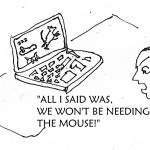Our cents
5
Reflections - news - topical issues

Kiosk economies – our future in a circular world
“Kiosk Economies” are a complex web of small, ‘temporary’, stand-alone systems used to create livelihoods in high-unemployment countries. These economies derive their name from the ‘Spaza’ or kiosk shop, located in high traffic zones, usually manned by one or two individuals who help attract attention to the booth to get new customers. Retail kiosks are frequently located on busy city streets with significant foot traffic, and provide owners with a low-cost alternative to market their products or services.
Coping in collapsed economies
This kiosk economy is an important phenomenon in African countries, accounting for up to 90% of the jobs in the lowest income Sub-Saharan countries. The IMF estimates the kiosk economy’s share of the global economy has been falling on average over the last decade but remains at a weighted average of 34% in Sub-Saharan Africa, compared with 9% in North America and 15% in the OECD countries. It says the informal sector contributed between 25% and 65% of GDP, with Mauritius and South Africa at the low-end under 25% and Tanzania (over 50%) and Nigeria (over 60%) at the high end.
The difficult business environment of many African economies encourages small and medium sized businesses to remain informal. Unsurprisingly, high taxes and stifling regulation by a “low quality bureaucracy” top the list of grievances. Or to be more specific, it is “how many taxes a company must pay and how much time it takes to declare and pay them, rather than the tax rates themselves which create a bottleneck for businesses,” Yinka Adegoke of Quartz Africa.
Unintended consequences, emerging conflict – the Zimbabwe example
In Zimbabwe, the informal sector is a major player in the economy as it contributes an estimated 48% of the Gross Domestic product (GDP) and an estimated 42% of the total national employment. The informal sector in Harare manifests in the form of flea markets, social markets, home industries and guarded car parks. There is serious contestation for space between the ever-increasing informal traders and human traffic, a development that has triggered several conflicts between the former and the municipality.
The economy has also undergone significant structural transformation in the past decade, which has seen the formal sector being replaced by a growing informal sector.
In reference to this transformation of the economy towards informalisation, ZEPARU[1] and BAZ[2] have implied that the traditional business models cannot continue to be applied and there is need to adopt new mechanisms that are best able to serve the emerging class of business clientele.
The start of the informalisation of the economy goes back to the nineties and structural adjustment programmes. Cutbacks in government spending and public sector downsizing resulted in increased unemployment in the formal sector, which forced people to join the informal sector. The post-land reform recession in the two-thousands sent private business the same way. The consequences and impact of Covid-19 have still to play out but it is very unlikely there will be any slowing or reversing of this trend.
The Kiosk economy is the economy
The average revenue for the informal sector players is about US$1,413, per month with the maximum being about US$24,000 per month, which is way ahead of the salaries for formal sector players. The largest sales revenues flow through the retail and manufacturing sectors of the Kiosk economy. Manufactures can generate over US$2,000 per month while commuter business might do just under US$1,000 per unit per month. About 17% of the manufacturing informal sector players have linkages with formal sector players.
The Kiosk economy is financed by microfinance institutions (31%), family (28%), Banks (23%), and others, like ‘plutocrats’, (18%). The average loan taken from Banks is around US$17,000. Kiosk economy players vary in their ability to service loans – most commuter businesses find it easy; others find the maturity periods too short or demand too fickle.
Taking us home
Can the Kiosk economy take us where our Governments can’t? With less formal business and less government, can we, as a community look beyond the current take-make-waste formal industrial model, to a circular economy that aims to redefine growth, focusing on positive society-wide benefits. It entails gradually decoupling economic activity from the consumption of finite resources and designing waste out of the system. Underpinned by a transition to renewable energy sources, the circular model builds economic, natural, and social capital. For it to flourish requires us to:
- Design out waste and pollution
- Keep products and materials in use
- Regenerate natural systems, “making rivers run again”
- Address the major constraints in the informal sector
- Reward people more equitably
- Build on the success of electronic and mobile financial platforms
As the Ellen Macarthur Foundation puts it: “The goal is not to minimise the cradle-to-grave flow of materials, but to generate cyclical, cradle-to-cradle ‘metabolisms’ that enable materials to maintain their status as resources and accumulate intelligence over time (up-cycling). This inherently generates a synergistic relationship between ecological and economic systems, a positive re-coupling of the relationship between economy and ecology”.
Post-Corona, it will be about all of us creating a balance between formal and informal, corporate and kiosk, public and private, north and south and rich and poor. Governments won’t do it.
[1] Zimbabwe Economic Policy Analysis and Research Unit (ZEPARU)
[2] Bankers’ Association, Zimbabwe (BAZ)
Engage Q Partnership if you are interested in discussing these ideas further.

Agriculture House, 1 Adylinn Road (Corner Marlborough Drive) , Marlborough, Harare, Zimbabwe
Our Solutions
© 1999-2023 Q Partnership Management Consultants




